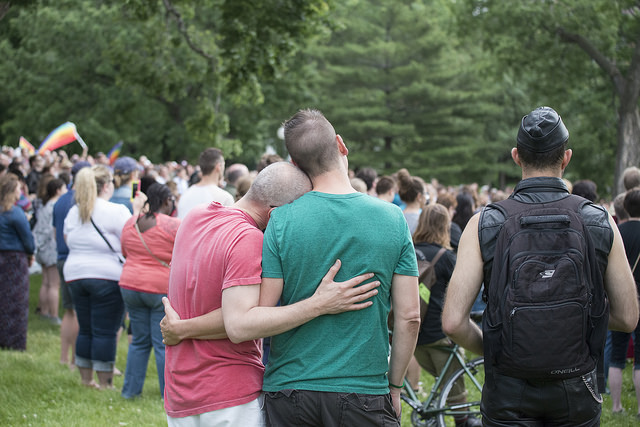
A couple at a vigil to unite in the wake of the Orlando Pulse shooting Fibonaci Blue / CC 2016
Our hearts and thoughts are with the people of Orlando.
Before I saw the death count, the photos of the scene, or the statements from the President and the victims' families, I saw the outrage at the media and their coverage of the Orlando tragedy. It was all over my Facebook feed. Friends and colleagues ourtaged that mainstream media outlets were reporting on the shooter's religion and his supposed connection to ISIS (and Hezbollah, and al Qaeda, and nationalists in Afghanistan, and on and on). While my Facebook feed and many in the progressive media highlighted the homophobic roots of this tragedy and the danger of the then-still-nascent Islamophobic backlash, the mainstream media was all over the place: Was Omar Mateen an extremist? A (crazy, homophobic) lone wolf? Maybe both? Two days after the worst mass shooting in U.S. history, competition for the narrative about what happened in Orlando - and why - is just beginning.
Narratives help us make sense of a complex and uncertain world
In the aftermath of tragedies like this one, there are tons of facts, rumors, and data points spinning through the media. Narratives - commonly-held storylines that exist in media, in our hearts and minds, and in everyday conversation - help us take these disparate pieces of information and fit them into a coherent story about 'what happened.' Journalists do this, politicians do this, and news consumers do this. It's how people make sense of a complex world. Some people will try to separate what's real from what's not before deciding 'what happened,' in the event of extremist violence or a mass shooting. But plenty of people won't. Most will retreat to their regular corners, relying on prior assumptions rather than new information. This kind of retreat redoubles people's prior beliefs, for better and for worse.
What narrative will help us move forward together?
The narrative that violence has social causes - which we can work together to undo - can be extraordinarily useful in building and rebuilding communities in the aftermath of violence. This narrative can also expose the deep histories of violence and injustice that began long before the Orlando shooting. It can help us make connections between multiple forms or scales of violence that we may not have seen otherwise. No narrative can change what happened, nor can any narrative on its own change the many ways that different forms of violence shape everyday life. People have to make those changes, and narratives are tools that can help.
As you can tell, we've been reading a lot about Orlando. Here are some of the things that have moved us. Read something that has moved you? Tell us about it in the comments.